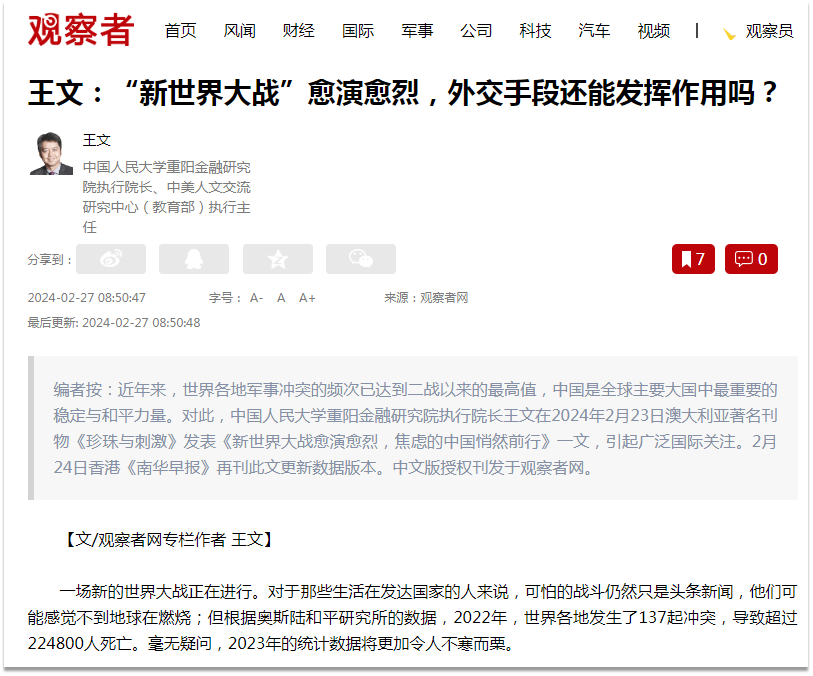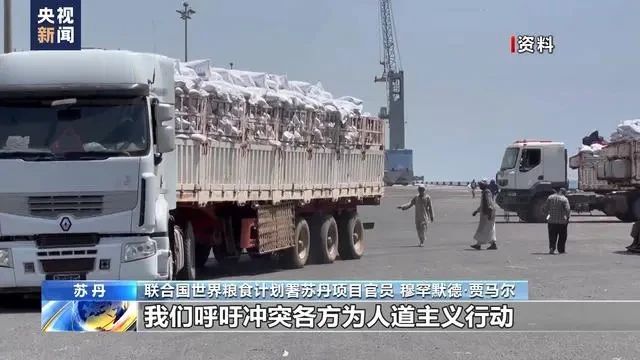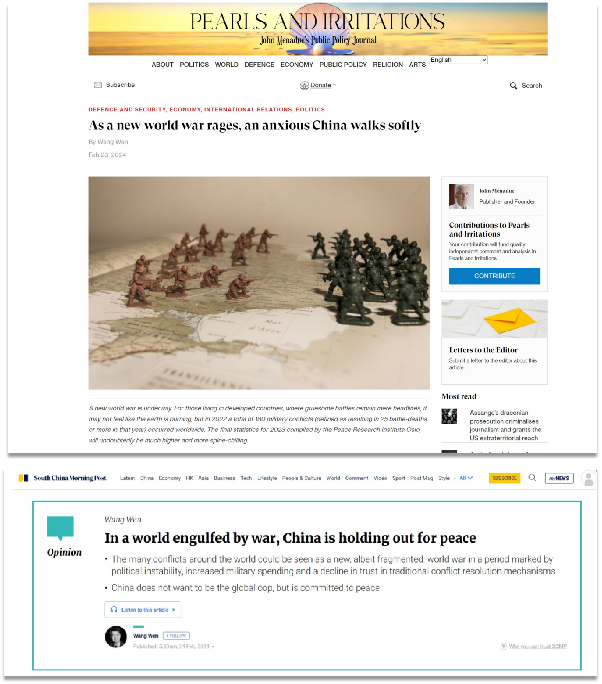发布时间:2024-02-28 作者: 王文
近年来,世界各地军事冲突的频次已达到二战以来的最高值,中国是全球主要大国中最重要的稳定与和平力量。对此,中国人民大学重阳金融研究院执行院长王文2月23日在澳大利亚著名刊物《珍珠与刺激》发表《“新世界大战”愈演愈烈,焦虑的中国悄然前行》一文,引起广泛国际关注。
编者按:近年来,世界各地军事冲突的频次已达到二战以来的最高值,中国是全球主要大国中最重要的稳定与和平力量。对此,中国人民大学重阳金融研究院执行院长王文2月23日在澳大利亚著名刊物《珍珠与刺激》发表《“新世界大战”愈演愈烈,焦虑的中国悄然前行》一文,引起广泛国际关注。2月24日《南华早报》再刊此文更新数据版本。2月27日,观察者网首页推荐发布中文版。现将文章中英文版内容发布如下:
中文版

▲观察者网首页推荐发布中文版
一场新的世界大战正在进行。对于那些生活在发达国家的人来说,可怕的战斗仍然只是头条新闻,他们可能感觉不到地球在燃烧;但根据奥斯陆和平研究所的数据,2022年,世界各地发生了137起冲突,导致超过224800人死亡。毫无疑问,2023年的统计数据将更加令人不寒而栗。
地球上四分之一的人口,即约20亿人,生活在直接受军事冲突影响的地区。军队、民兵和狂热分子之间的战斗和冲突使更多的人陷入危险,这比二战以来的任何时候都要多。
如果说第一次、第二次世界大战的特点是整个欧亚大陆的大规模战争,那么,当前的“新世界大战”虽是碎片化的,却真正是全球性的。当今战争的持续时间和影响是第二次世界大战以来从未有过的。
世界各地的冲突平均持续8-11年。五分之一“已解决”的冲突将在一年内重新爆发。这些看似毫无关联的冲突导致了世界各地频繁的人道主义灾难,迫使全球各地不计其数地进行援助。
2022年,约1.1亿人因战争、迫害、暴力和侵犯人权行为而流离失所。到2024年,这一数字预计将跃升至1.5亿,远远超过二战期间流离失所的6000万人。
持续两年的俄罗斯和乌克兰冲突已导致超过590万人流离失所。2023年爆发的苏丹内战已导致超过1000万人流离失所。近两年来,非洲国家已发生六次军事政变。长达五个月的加沙冲突的残酷性和破坏性震惊了世界。加沙地带一半以上的建筑被摧毁或损坏,85%的人口流离失所,日益严重的人道主义危机前所未有。

▲联合国官员:苏丹约一半人口需要人道主义援助(图片来源:央视新闻)
委内瑞拉、危地马拉、厄瓜多尔等国的政治分裂导致更多武装冲突。亚太安全形势也面临挑战。朝鲜半岛、缅北、菲律宾等重要地区是潜在的冲突热点。
对于相当多的地区来说,实现长期、持续的和平似乎越来越困难。
本土军事力量的崛起成为影响全球和平的新变量。红十字国际委员会已确定614个非国家武装团体“引起人道主义关切”,约有6000万—8000万人生活在这些组织的控制之下。
这些组织具有高度的灵活性,可以在意想不到的地方引发国际争端。一旦他们成为大国的“战争代理人”,就能迅速获得大量高科技武器,为解决地区冲突增加难度。有研究报告显示,在中东、非洲、拉美地区,新一轮代理人战争正在兴起。
更糟糕的是,传统的冲突解决机制面临彻底失败的风险,联合国、G20等国际多边治理机制不再具有实现和平的权威和能力。过去十年来,没有一场战争是通过国际斡旋而结束并达成全面和平协议的。各方通过外交手段解决地区冲突的能力似乎大大削弱。
冷战后世界秩序的不平衡、不合理,造成了“极度缺乏信任”的国际外交环境。世界似乎正在陷入日益混乱的无政府状态。
一些国家认为解决这种混乱的办法是放弃以不屈不挠、高尚原则和意识形态为特色的自由主义制度化路线,回归更为务实的现实政治道路。
然而,全球军费开支已创历史新高。2024年,美国国防预算达到创纪录的8860亿美元,约占全球军费开支的40%。法国军费开支跃升至497亿美元,增长7.5%;日本计划支出559亿美元,增长16.5%;俄罗斯军费开支将猛增68%,达到1200亿美元。据报道,2023年中国军费开支为2240亿美元,比上年增长7.2%。
在人工智能的助力下,军事武器也正在经历巨大的变化。无人机和军用机器人正在加剧这场新世界大战的破坏力。这无疑增强了强国发动、参与或资助战争的能力。
新一代人工智能制导武器将战场变成了绞肉机,被征召入伍的穷人们几乎没有机会幸存。
这一切都让我非常担心:这场新的世界大战可能会进一步恶化,成为一场规模更大的全球性战争,造成的人员伤亡无疑比以往任何一场战争都要多。
许多中国学者曾经期许,美国在推动着真正的国际和平——所谓的“美国治下的和平”中发挥主导作用。然而,美国全球领导力的影响力正在减弱。美国智库的研究报告和美国政府的战略文件显示,美国在地区冲突中的党派倾向日益明显,即便这种倾向意味着会将造成更大的人道主义痛苦与灾难。
在大多数中国人看来,美国当前的对外战略正在挑起全球认知战争,鼓吹二元对立,策划多重地区冲突。
世界纷繁复杂的冲突和混乱,干扰着新兴经济体的正常发展,也频频为中国的崛起制造障碍。在中国人看来,这只能被视为美国有意护持其霸权的延续。我们认为,这是一种极其自私的立场,有碍世界和平。真正的全球领导人应该是冲突协调者,而不是麻烦制造者。
中国随时准备帮助调解冲突,但不愿意成为“世界法官”或“全球警察”,即便中国在各种冲突中派遣了2000名联合国维和人员。
中国对俄罗斯与乌克兰冲突、巴以冲突、印巴冲突、缅北冲突以及与台湾和南海有关的潜在军事风险保持警惕。中国希望拥有强大的自卫军事能力,尽快实现国家的真正统一。
中国不想卷入任何军事冲突,过去40年的和平记录清楚地表明了这一点。对于中国人民来说,做最好的自己,就是中国对世界和平的最大贡献。
也许西方很难对中国抱有太多感情,因为中国与20个邻国中的一些邻国之间存在着摩擦和分歧。如果受到挑衅并跨越红线,中国将毫不犹豫地捍卫自己的主权。但这不是每个有自尊的国家的首要规则吗?
不过,长期以来,中国一直都耐心地压抑着对外军事反应的冲动,且聪明地协调着各种矛盾。展望未来,中国虽然面临诸多战争诱惑,可能被迫卷入战争,但也希望保持和平的阻尼器,这正是正在努力缓解当前正在发生新世界大战的中国式努力。
英文版

▲澳大利亚著名刊物《珍珠与刺激》、香港《南华早报》发布英文版
A new world war is underway. For those living in developed countries, where gruesome battles remain mere headlines, it may not feel like the earth is burning, but in 2022 a total of 180 military conflicts (defined as resulting in 25 battle-deaths or more in that year) occurred worldwide. The final statistics for 2023 compiled by the Peace Research Institute Oslo, will undoubtedly be much higher and more spine-chilling.
A quarter of the earth’s population, about 2 billion people, live in areas directly impacted by military conflict. Battles and clashes between militaries, militias and zealots have put more people in danger than at any time since World War II.
While the First and Second world wars featured large-scale battles throughout Eurasia, the current new world war is fragmented, but nonetheless global. The duration and impact of today’s wars have not been seen since World War II.
Conflicts around the world now last between eight and 11 years. One in five “resolved” conflicts will reignite within a year. These apparently unconnected conflicts have led to humanitarian disasters in all corners of the world, and draw mega-tons of aid from around the globe.
In 2022, some 110 million people were displaced by war, persecution, violence, and human rights violations. In 2024, that number is expected to jump to 150 million, far exceeding the 60 million people who were displaced during World War II.
The two-year Russia-Ukraine conflict has displaced more than 5.9 million people. The Sudan Civil War that broke out in 2023 has pushed more than 10 million people from their homes. In the past two years, six military coups have occurred in African countries. The brutality and destructiveness of the five-month conflict in Gaza has shocked the world. More than half of the buildings in the Gaza Strip have been destroyed or damaged, 85 percent of the population has been displaced, and the growing humanitarian crisis is unprecedented.
Political fragmentation in Venezuela, Guatemala, Ecuador and other countries are leading to still more armed conflicts. The security situation in the Asia-Pacific also faces challenges. The Korean Peninsula, northern Myanmar, the Philippines and other important regions are potential conflict hotspots.
For a considerable number of regions long-term, continuous peace seems increasingly difficult to achieve.
The rise of localised military forces has become a new variable affecting global peace. The Red Cross International Commission has identified 614 non-state armed groups that are a “cause [for] humanitarian concern” with about 60 to 80 million people living under the control of such organisations.
These organisations are highly flexible and can trigger international disputes in unexpected places. If they become a “conflict proxy” for major powers, they can quickly obtain a large number of high-tech weapons that add another level of difficulty to resolving regional conflicts. Some research reports show that in the Middle East, Africa, and Latin America, a new round of proxy wars is emerging.
To make matters worse, the traditional conflict resolution mechanism is at risk of complete failure, and international multilateral governance mechanisms, such as the United Nations and G20, no longer have the perceived authority or ability to bring about peace. Over the past ten years, no war has ended through international mediation that concluded with a comprehensive peace agreement. The ability of all parties to solve regional conflicts through diplomatic means seems to have greatly weakened.
The lopsided and unreasonable post-Cold-War world order has created an international diplomatic environment that features an “extreme lack of trust.” The world is seemingly being pushed into an increasingly chaotic anarchy.
Some countries see a solution to this disorder in abandoning the liberal institutionalised route highlighted by unbending, high-minded principles and ideology, and returning to the more pragmatic path of realpolitik.
Yet, global military spending has reached a record high. In 2024, the US defence budget reached a record 886 billion U.S. dollars, accounting for about 40 percent of global military expenditures. French military expenditure jumped to 49.7 billion US dollars, an increase of 7.5%; Japan is planning to spend 55.9 billion US dollars, up 16.5%; Russia military spending will jump a whopping 68 percent to reach 120 billion US dollars. In 2023, China reportedly spent 224 billion US dollars on its military, an increase of 7.2% over the previous year.
Military weaponry is also undergoing a massive sea change with the help of AI. Drones and military robots are adding to the destructive powers of this new world war. This undoubtedly enhances the ability of a powerful country to launch, participate, or fund war.
Poor citizens who are recruited to their army stand little chance of surviving the precision of the new generation of AI guided weapons that turn battlefields into meat grinders.
All of this makes me extremely worried: this new world war could further deteriorate and become a larger global war that would undoubtedly inflict a greater number of casualties than any previous war.
Many Chinese scholars once hoped that the United States would play a leading role in the development of true international peace-Pax Americana, as it were. However the influence of US global leadership is waning. Research reports from U.S. think tanks and strategic documents of the US government show the US is increasingly partisan in regional conflicts, even when it means their side will inflict greater suffering and humanitarian pain.
From the perspective of most Chinese people, the current foreign strategy of the U.S. is provoking the global cognitive war, advocating binary opposition and planning multiple regional conflicts.
The multitude of conflicts and chaos in the world interfere with the normal development of emerging economies, and are creating frequent roadblocks to China’s rise. From our perspective this can only be seen as the US intentionally trying to protect the continuation of its hegemony. We feel this is an extremely selfish stance that stands in the way of world peace. A real global leader should be a conflict coordinator, not a troublemaker.
China is always ready to help mediate a conflict, but is unwilling to be the world’s judge, or global cop, even as it contributes 2,000 UN Peacekeepers in various conflicts.
The Chinese are vigilant in regard to the Russia-Ukraine conflict, Palestinian-Israeli conflict, Indian-Pakistan conflict, northern Myanmar conflict, and the potential military risks relating to Taiwan and South China Sea. China hopes to have strong self-defence military capabilities and realise the true unity of the country as soon as possible.
China does not want to be involved in any military conflict, as its peaceful record over the past 40 years plainly shows. For the Chinese people, being one’s best self is China’s greatest contribution to the world peace.
Perhaps it is difficult for the West to hold much affection for China, as it navigates the friction and differences with and between some of its 22 neighbours. If provoked and its red lines are crossed China will never hesitate to defend its sovereignty. But isn’t this the first rule of every self-respecting country?
However, for a long time, China has been patiently suppressing the impulse to practice military responses, while wisely coordinating various contradictions. Looking into the future, although China faces many temptations of war and may be forced into war, it also hopes to maintain a peaceful damper, which is exactly the Chinese-style efforts that are working hard to alleviate the new world war currently underway.
(欢迎关注人大重阳新浪微博:@人大重阳 ;微信公众号:rdcy2013)